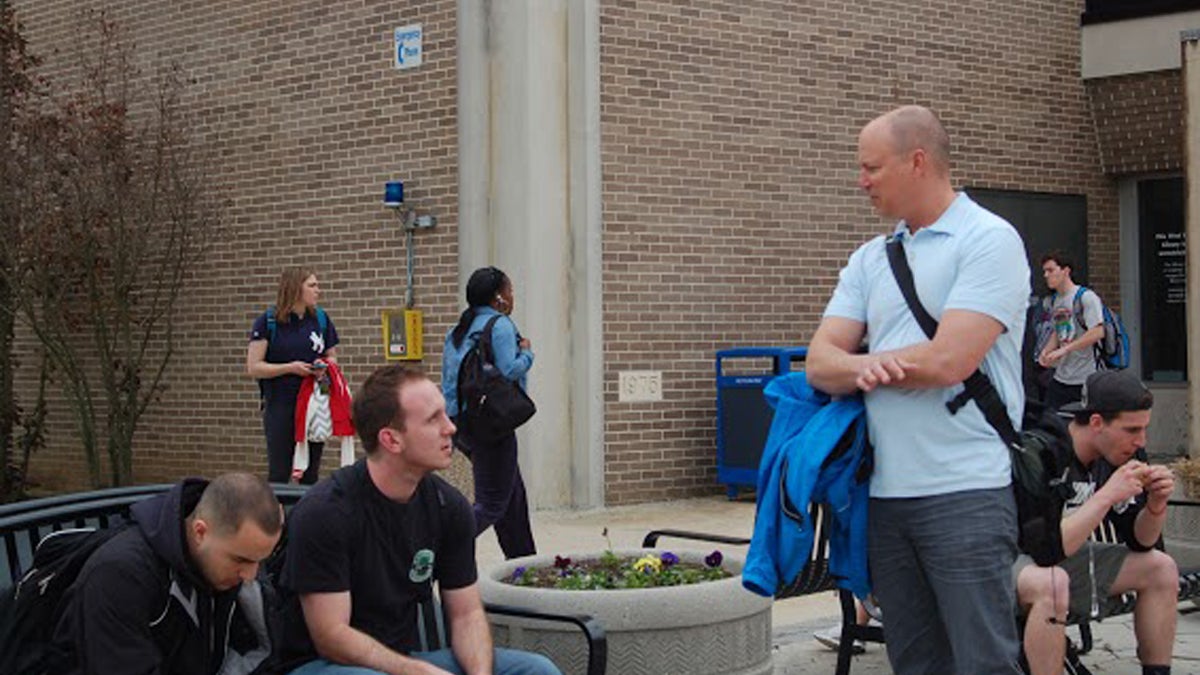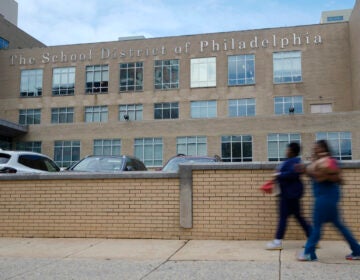Shared costs of Pa. community college shift primarily to students

Students sit outside at West Chester University (Sara Hoover/WHYY)
Public universities and colleges across the country are relying on tuition more than ever before. At 47 percent of the schools’ revenue, tuition represents the main source of funding for public higher education.
Pennsylvania’s post-secondary schools are no different, but that wasn’t the way they were envisioned more than a half-century ago.
Founded in 1963, Pennsylvania’s community colleges had a mandate for equal funding from three sources: the state, the county and students. In the face of shrinking state and local funding in recent years, however, community colleges have had to increase tuition, making it much more than the intended one-third of revenue.
The community colleges in the area — Bucks, Delaware, Montgomery and Philadelphia — now receive about 20 percent of their revenue in state aid. County contributions make up 17 percent, half of what schools formerly saw, except for Delaware, which gets only 9 percent.
Meanwhile, tuition makes up 50 to 70 percent of their budgets, more than double what was intended.
Jerry Parker, president of Delaware County Community College, says his school’s funds comes from 12 school districts rather than the county.
“Their responsibility is to raise local millage to support the college, and the way they do that is by putting our budget within their budget,” he said. “Therein lies part of the problem because we’re seen, unfortunately, as another taxpayer burden.”
It creates a competitive environment with the school districts for the same local tax dollars, he said, noting that educational institutions depend on property taxes — something he hopes Gov. Tom Wolf recognizes as he works on property tax relief.
Despite the original tripartite funding plan, Parker said the burden has never been equally divided and has shifted dramatically in his 37 years with community colleges.
Tuition freeze or increase
As part of his proposed increase of $15 million in state funds, Gov. Tom Wolf asked the state’s community colleges for a one-year tuition freeze. Yet, Delaware, Bucks and Montgomery will charge more tuition next year.
With declining enrollment, most area community colleges have not been able to freeze tuition rates and balance their budgets. Budget reductions, including faculty cuts, have not been enough to make up for the loss of students.
Delaware County has increased tuition by more than 5 percent, double its previous hikes.
“We were faced with a deficit that we just couldn’t avoid,” Parker said. “So, basically, we split the deficit with the students. We’re pulling the remaining funds from a reserve.”
Montgomery County Community College is proposing a 2.3 percent tuition increase.
Stephanie Shanblatt, president of Bucks County Community College, said the school’s 3.8 percent increase primarily covers costs of inflation.
“Despite our best efforts, expenses do go up a little bit,” she said. “We have contractual obligations, and really tuition is the one place where we can fill that gap.”
State and county funding have been level, she said, so tuition now accounts for 53 percent of the school’s revenue.
“We’re hopeful that we may get additional money from the state,” said Shanblatt said. “We could raise tuition much less, if at all. It’s very difficult to continue to balance the budget just by cutting every line a little bit.”
Westmoreland County Community College in Western Pennsylvania approved a tuition hike of nearly 25 percent, the largest increase of the state’s community colleges so far.
Community College of Philadelphia President Donald Generals has said his school will not increase tuition.
Neither will the 14 universities that make up the Pennsylvania State System of Higher Education. The system’s board voted 9-8 to freeze tuition, as long as they get their full state aid request of $45.3 million.
Even though tuition may not go up, students face other costs — books and meals plans, for instance — that could increase under Wolf’s sales tax proposal. That would translate into an additional $428 per year for students, according to an estimate from the State System of Higher Education. A tuition increase at the rate of inflation would be significantly less.
WHYY is your source for fact-based, in-depth journalism and information. As a nonprofit organization, we rely on financial support from readers like you. Please give today.




